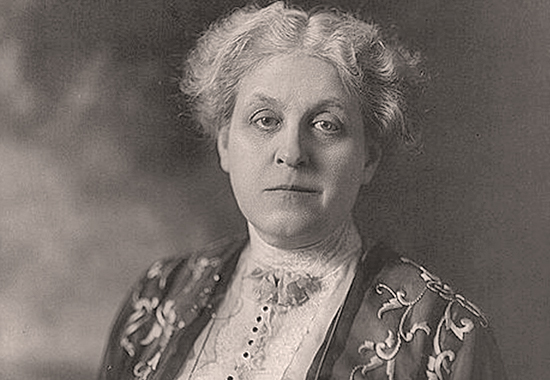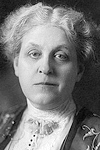|

LIBERTY IS SAYING TO AMERICA,
"COME!" - CARRIE CHAPMAN CATT 1917
Onward and Upward
It follows an excerpt from the text transcript of
Carrie Chapman Catt's Onward and Upward speech,
delivered at Poli's Theater, Washington D.C. —
December 12-15, 1917.

 |
Woman suffrage is
inevitable. |
Suffragists knew
it before November 4, 1917; opponents afterward.
Three distinct causes made it inevitable.
First, the history of our country.
Ours is a nation born of revolution, of
rebellion against a system of government so
securely entrenched in the customs and
traditions of human society that in 1776 it
seemed impregnable. From the beginning of
things, nations had been ruled by kings and for
kings, while the people served and paid the
cost. The American Revolutionists boldly
proclaimed the heresies: "Taxation without
representation is tyranny." "Governments derive
their just powers from the consent of the
governed." The colonists won, and the nation
which was established as a result of their
victory has held unfailingly that these two
fundamental principles of democratic government
are not only the spiritual source of our
national existence but have been our chief
historic pride and at all times the sheet anchor
of our liberties.
Eighty years after the Revolution, Abraham
Lincoln welded those two maxims into a new one:
"Ours is a government of the people, by the
people, and for the people." Fifty years more
passed and the president of the United States,
Woodrow Wilson, in a mighty crisis of the
nation, proclaimed to the world: "We are
fighting for the things which we have always
carried nearest to our hearts: for democracy,
for the right of those who submit to authority
to have a voice in their own government."
All the way between these immortal aphorisms
political leaders have declared unabated faith
in their truth. Not one American has arisen to
question their logic in the 141 years of our
national existence. However stupidly our country
may have evaded the logical application at
times, it has never swerved from its devotion to
the theory of democracy as expressed by those
two axioms.
[...]
With such a history behind it, how can our
nation escape the logic it has never failed to
follow, when its last unenfranchised class calls
for the vote? Behold our Uncle Sam floating the
banner with one hand, "Taxation without
representation is tyranny," and with the other
seizing the billions of dollars paid in taxes by
women to whom he refuses "representation."
Behold him again, welcoming the boys of
twenty-one and the newly made immigrant citizen
to "a voice in their own government" while he
denies that fundamental right of democracy to
thousands of women public school teachers from
whom many of these men learn all they know of
citizenship and patriotism, to women college
presidents, to women who preach in our pulpits,
interpret law in our courts, preside over our
hospitals, write books and magazines, and serve
in every uplifting moral and social enterprise.
Is there a single man who can justify such
inequality of treatment, such outrageous
discrimination? Not one.
[...]
Second, the
suffrage for women already established in the
United States makes women suffrage for the
nation inevitable. When Elihu Root, as president
of the American Society of International Law, at
the eleventh annual meeting in Washington, April
26, 1917, said, "The world cannot be half
democratic and half autocratic. It must be all
democratic or all Prussian. There can be no
compromise," he voiced a general truth.
Precisely the same intuition has already taught
the blindest and most hostile foe of woman
suffrage that our nation cannot long continue a
condition under which government in half its
territory rests upon the consent of half of the
people and in the other half upon the consent of
all the people; a condition which grants
representation to the taxed in half of its
territory and denies it in the other half a
condition which permits women in some states to
share in the election of the president,
senators, and representatives and denies them
that privilege in others. It is too obvious to
require demonstration that woman suffrage, now
covering half our territory, will eventually be
ordained in all the nation. No one will deny it.
The only question left is when and how will it
be completely established.
Third, the
leadership of the United States in world
democracy compels the enfranchisement of its own
women. The maxims of the Declaration were once
called "fundamental principles of government."
They are now called "American principles" or
even "Americanisms." They have become the
slogans of every movement toward political
liberty the world around, of every effort to
widen the suffrage for men or women in any land.
Not a people, race, or class striving for
freedom is there anywhere in the world that has
not made our axioms the chief weapon of the
struggle. More, all men and women the world
around, with farsighted vision into the verities
of things, know that the world tragedy of our
day is not now being waged over the
assassination of an archduke, nor commercial
competition, nor national ambitions, nor the
freedom of the seas. It is a death grapple
between the forces which deny and those which
uphold the truths of the Declaration of
Independence.
[...]
Do you realize that in no other country in the
world with democratic tendencies is suffrage so
completely denied as in a considerable number of
our own states? There are thirteen black states
where no suffrage for women exists, and fourteen
others where suffrage for women is more limited
than in many foreign countries.
Do you realize that when you ask women to take
their cause to state referendum you compel them
to do this: that you drive women of education,
refinement, achievement, to beg men who cannot
read for their political freedom?
Do you realize that such anomalies as a college
president asking her janitor to give her a vote
are overstraining the patience and driving women
to desperation?
Do you realize that women in increasing numbers
indignantly resent the long delay in their
enfranchisement?
Your party platforms have pledged women
suffrage. Then why not be honest, frank friends
of our cause, adopt it in reality as your own,
make it a party program, and "fight with us"? As
a party measure, a measure of all parties, why
not put the amendment through Congress and the
legislatures? We shall all be better friends, we
shall have a happier nation, we women will be
free to support loyally the party of our choice,
and we shall be far prouder of our history.
"There is one thing mightier than kings and
armies" — aye, than Congresses and political
parties — "the power of an idea when its time has
come to move." The time for woman suffrage has
come. The woman's hour has struck. If parties
prefer to postpone action longer and thus do
battle with this idea, they challenge the
inevitable. The idea will not perish; the party
which opposes it may. Every delay, every trick,
every political dishonesty from now on will
antagonize the women of the land more and more,
and when the party or parties which have so
delayed woman suffrage finally let it come,
their sincerity will be doubted and their appeal
to the new voters will be met with suspicion.
This is the psychology of the situation. Can you
afford the risk? Think it over.
We know you will meet opposition. There are a
few "women haters" left, a few "old males of the
tribe," as Vance Thompson calls them, whose duty
they believe it to be to keep women in the
places they have carefully picked out for them.
Treitschke, made world famous by war literature,
said some years ago,
"Germany, which knows all
about Germany and France, knows far better what
is good for Alsace-Lorraine than that miserable
people can possibly know."
A few American Treitschkes we have who know better than women
what is good for them. There are women, too,
with "slave souls" and "clinging vines" for
backbones. There are female dolls and male
dandies. But the world does not wait for such as
these, nor does liberty pause to heed the plaint
of men and women with a grouch. She does not
wait for those who have a special interest to
serve, nor a selfish reason for depriving other
people of freedom. Holding her torch aloft,
liberty is pointing the way onward and upward
and saying to America, "Come."
To you and the supporters of our cause in Senate
and House, and the number is large, the
suffragists of the nation express their grateful
thanks. This address is not meant for you. We
are more truly appreciative of all you have done
than any words can express. We ask you to make a
last, hard fight for the amendment during the
present session. Since last we asked a vote on
this amendment, your position has been fortified
by the addition to suffrage territory of Great
Britain, Canada, and New York.
Some of you have been too indifferent to give
more than casual attention to this question. It
is worthy of your immediate consideration. A
question big enough to engage the attention of
our allies in wartime is too big a question for
you to neglect.
Some of you have grown old in party service. Are
you willing that those who take your places by
and by shall blame you for having failed to keep
pace with the world and thus having lost for
them a party advantage? Is there any real gain
for you, for your party, for your nation by
delay? Do you want to drive the progressive men
and women out of your party?
Some of you hold to the doctrine of states'
rights as applying to woman suffrage. Adherence
to that theory will keep the United States far
behind all other democratic nations upon this
question. A theory which prevents a nation from
keeping up with the trend of world progress
cannot be justified.
Gentlemen, we hereby petition you, our only
designated representatives, to redress our
grievances by the immediate passage of the
Federal Suffrage Amendment and to use your
influence to secure its ratification in your own
state, in order that the women of our nation may
be endowed with political freedom before the
next presidential election, and that our nation
may resume its world leadership in democracy.
Woman suffrage is coming, you know it. Will you,
Honorable Senators and Members of the House of
Representatives, help or hinder it?

More History
|
|